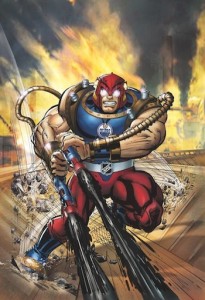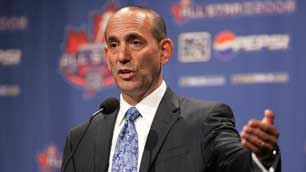
Look upon the Edmonton Oiler, ye mighty, and despair!
The National Hockey League’s All-Star Weekend has come and gone, generally creating a positive buzz for professional hockey in North America.
The All-Star Fantasy Draft, where captains Eric Staal and Nicklas Lidstrom selected their superstar teams schoolyard style, was a huge success, averaging 600,000 viewers in the United States.
Unfortunately, the lingering product from the gala event in Raleigh N.C. is the Guardian Project, the NHL’s misguided attempt at drawing in today’s youth.
The Guardian Project is a marketing campaign where legendary comic book creator Stan Lee designs super heroes based off the names of all 30 NHL franchises.
Sounds good in theory, but in practice the idea plays out like a super villain’s hare-brained scheme. Stan Lee + comic books + hockey teams + ???? = world domination.
In other words, it’s not very well thought out.
The NHL Guardians are problematic from their very conception. First, Stan Lee simply doesn’t have as much cultural cache as he once did. After all, he hasn’t had a monthly title since Ravage 2009 in the early 1990s. You know, when the Guardian Project’s target demographic was still years away from being born.
Second, the characters themselves are lame. Witness Chris Sims of ComicsAlliance epic takedown: The Ten Most Insane Characters From Stan Lee's 'NHL Guardians'.
Many of the characters seem to be based on a brief skimming of each franchise’s Wikipedia page. Important details like the military heritage of the Chicago Blackhawks and Toronto Maple Leafs aren’t touched on at all.
Most importantly, the NHL’s marketing department is once again playing away from the game’s strengths.
Hockey is one of North America’s oldest sports, with the NHL’s Original Six predating any National Basketball Association franchise, only a handful of National Football League teams and most Major League Baseball clubs.
It’s a disgrace that the Montreal Canadiens, a franchise that is over 100 years old and a cornerstone of Quebecois society, is being represented by the likes of this:

But campaigns like Project Guardians relies on trendy thinking that makes the NHL seem newer than the Arena Football League or other shaky niche sports.
Seriously – the Tampa Bay Storm of the Arena Football League predate the Tampa Bay Lightning by five years. The Charlotte Rage were created and folded before the Carolina Hurricanes moved from Hartford, Conn. The list goes on and on.
Commissioner Gary Bettman and the rest of the powers that be at the NHL have to learn that if they really want to make inroads in the Sun Belt, they need to educate and inform their new fanbase about the rich history and tradition of the game, not disregard it.
Otherwise, the NHL comes off as just the latest in a long line of failed sporting enterprises.
That’s why innovations like the All-Star Fantasy Draft and the Winter Classic have been so successful: because they are reminiscent of the history and tradition of hockey.
It’s also why the NHL’s Guardians Project was a dreadful misfire: it glosses over one of the most appealing aspects of hockey.

MLS Commissioner Don Garber did well to resolve the league's labour problems before they blew up.
Last week Major League Soccer successfully negotiated a new Collective Bargaining Agreement that will last into at least 2014.
The new deal adds quite a few wrinkles to player contracts, including raising the minimum salary to $40,000 USD and creating limited free agency. By all accounts both sides consider the deal to be a victory for their cause.
However, settling this labour dispute before it became an actual work stoppage is the biggest win of all for the MLS and its fans.
Why? Because with the notable exception of recalls or other Enron-like debacles, removing a product from the public consciousness is bad for business. Keeping a high profile, particularly for a relative luxury like a spectator sport, is crucial.
It’s all about building consumer habits. If people know to turn on Seinfeld on Thursday nights, if they can rely on the fact that they’ll have 22 minutes of entertainment every week, they’ll keep coming back.
If fans know they can flip on the TV and tune in to Toronto FC every Saturday afternoon, it’ll be built into their personal schedule. Breaking that habit severs the relationship between the league and its consumers.
In particular, sports outside of the “big four” (football, baseball, basketball and hockey) have to do the most to protect their brand.
Fringe sports like soccer, lacrosse, and auto racing have to make sure that they deliver a high quality product consistently, since they are fighting against leagues that already have generations of fandom. They’re trying to overcome decades, if not centuries, of habitual fandom.
A TV blackout or, worse yet, a labour dispute would wreck any kind of progress the MLS has made in the North American market.
Timing played a big role in this deal. Soccer is poised to step into the spotlight with the American side a serious contender in this summer’s World Cup. Further, David Beckham, the league’s biggest name, is going to be injured for at least the start of the season.
They need to capitalize on the hype surrounding the World Cup as well as soldier on through Beckham’s time off. Missing even part of a season under those circumstances would’ve been disastrous.
MLS also dodged some potentially negative press.
The National Football League and the National Basketball Association seem destined for labour crises in the next two years, and there’s the very real possibility that sports fans are going to become pretty cynical about professional athletes.
There is, after all, a recession on right now. As the National Hockey League Players Association found in the 2004 lockout season, earning millions of dollars playing a sport that you love and asking for more is not a particularly sympathetic stance, even if it is in comparison to billionaire owners.
Distancing the MLS from these other disputes is the right play.
Most of the specifics of the deal haven’t been publicly announced, but just the fact that MLS is guaranteed four more seasons of maintaining and, hopefully, building their public profile is good news.
MLS Commissioner Don Garber is now poised to take advantage of the goodwill created by the World Cup, and maybe even take some of the NFL and NBA’s market share.


